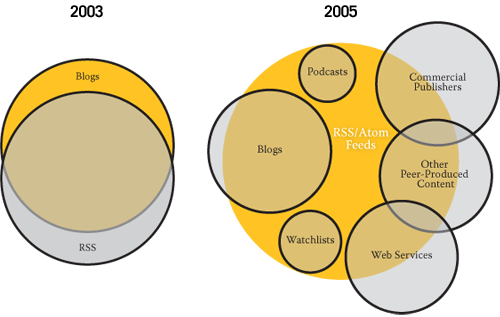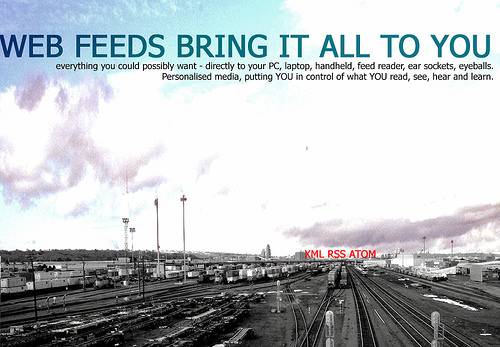Feedburner CEO Dick Costolo has just posted what I think is a milestone post for RSS
and Web 2.0: How
feeds will change the way content is distributed, valued, and consumed. In it he
expounds on the future direction of his company Feedburner, which I’ve long considered to be the
leading company in the RSS
Publishing space. (NB: this post is NOT about the other RSS
news of the day, Microsoft’s Simple Sharing Extensions. I’ll address that in a
separate post).
There are 3 themes in particular from Dick’s post which grabbed my attention:
1) RSS feeds encompass much more than blogs now
2) Feed becomes input to content on the site
3) Focus on the feed item – attach threads to the item and track it across the Web
while it gets remixed and re-published.
With regard to 1), many of us have been noticing the trend for RSS feeds to extend
into non-blog content. 2005 has really been the year in which that trend has solidified,
as Dick’s venn diagram perfectly illustrates:
Graphic courtesy of
Feedburner

Feed becomes input to content on the site
This is where it gets really interesting. Feeds becoming input to the website reminded
me of Erik Benson and others’ experiments with the Bloglines
API back in February 2005. At that time, Erik re-modelled his
whole blog so its content was entirely made up of inputs from his many feeds. He did
that because his content was being published all over the Web – in del.icio.us, Flickr,
43Things, LiveJournal, other blogs. So feeds became his method for keeping track of all
his content and bringing it all together.
It makes total sense for Feedburner to be right in the middle of this ‘pulling
together’ of feeds from all over the place – and other feed input mechanisms. People like
Erik have the programming knowledge to manage their feed ‘inputs’ this way, but the vast
majority of people (like me) would rather a service like Feedburner did that work for us
– via our Feedburner feed and some simple hook-ins to systems like Movable Type,
Wordpress and Typepad.
Dave Winer
recently pointed to a post
by Adam Green, which explored similar territory. Adam thinks 2006 will be the year
the Web explodes:
“The explosion I am talking about is the shifting of a website’s content from internal
to external. Instead of a website being a “place” where data “is” and other sites “point”
to, a website will be a source of data that is in many external databases,
including Google. Why “go” to a website when all of its content has already been absorbed
and remixed into the collective datastream.”
(emphasis mine)
His post specifically referenced Google, but I think this trend is much larger than
even Google. The thing which is going to tie all this together is of course feeds.
Mainly RSS, but perhaps Atom’s much-vaunted extensibility will come into play too.
Focus on the feed item
This gets to the heart of the matter and I think Feedburner is onto something big
here. Feedburner now views the item (e.g. a single post from your blog, or a specific
search result in a topic feed) as “the atomic unit of measure in the feed”, which will in
turn lead to Feedburner managing syndicated content “at a more atomic level by attaching
‘threads’ to the item.” It reminded me of the Design for Data and “content will be more important
than its container” themes I was big on at the end of last year and beginning of this
(and which I will be re-focusing on now). Incidentally those R/WW posts from a year ago
led to a collaboration with Joshua Porter on a Digital Web
article, which led to an O’Reilly Media book contract. But I digress…
If you think about it, focusing on the feed item is a profound change in how we think
about RSS feeds. Up till this year, most of us thought of RSS feeds as a way to subscribe
to single sources of content. But over 2005 it’s become apparent that content is being
remixed, mashed up and re-published across many sources – leading to heated ethical debates over
content rights and confusion amongst publishers on how to ‘monetize’ (sorry I can’t help
but use that word) their content. Fred Wilson had a nice
post on this theme recently, entitled The Future of Media (aka Please Take My RSS
Feed).
The 2.0 Toolset
Dan Saffer recently explored this issue from a different angle, a post entitled The Web 2.0
Experience Continuum. Dan’s post is all about the need for a next-generation tool set
to deal with what he calls semi-structured and unstructured Web experiences. He
wrote:
“The tools we’ll use to find, read, filter, use, mix, remix, and connect us to
the Internet will have to be smarter and do a lot more work than the ones we have
now.”
What he’s referring to is at the aggregation and filtering level, whereas Feedburner
is at the feed/item level. So I think there are opportunities for developers to create
those Aggregation 2.0 tools, which will complement what Feedburner is in the middle of
building.
Graphic courtesy of
Leigh Blackall

I’ve got my own ideas on what the next generation of Aggregator/Filter tools will look
like, so perhaps I’ll even get stuck in and try to build part of this vision out myself.
Exciting times!

















